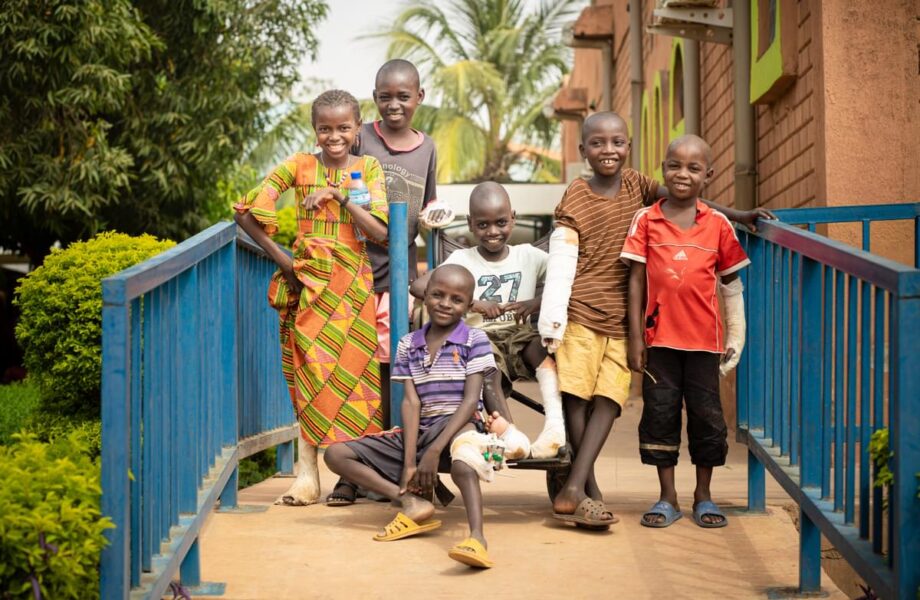Serving in the Sahel
Monday, June 26, 2023 at 4:19 pmWhen you pass through the gates at CURE Niger, the first thing you notice—besides the sweltering heat—is the beauty. On this patch of land on the northern edge of the capital city of Niamey, there are thousands of plants, hundreds of trees, bright colours, walking paths, and the country’s best—and only—wheelchair-accessible playground.
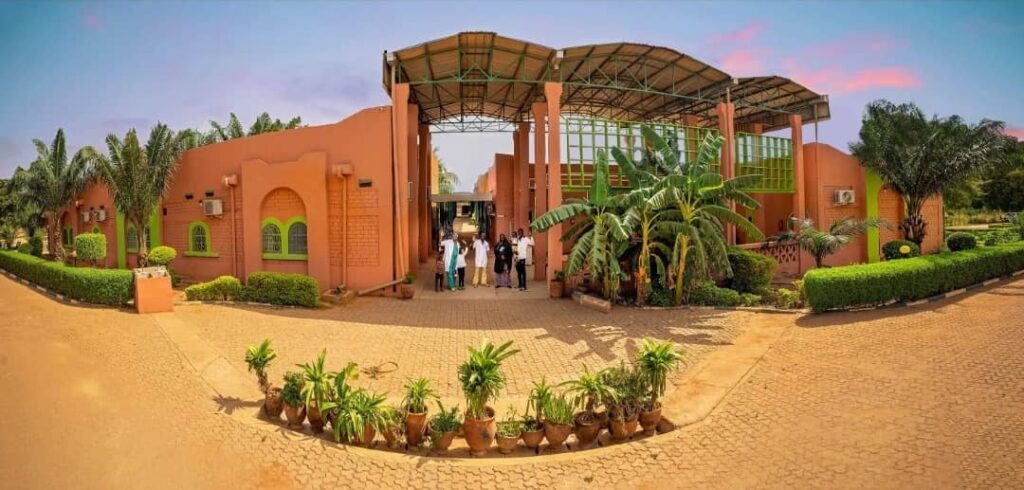
There’s almost no trace that before this land was home to Niger’s only paediatric hospital, it was a literal garbage dump—abandoned, deserted, neglected. Today, the hospital stands as a visual metaphor for the transformation our partners make possible in one of the hardest places on earth.
Pressed by Poverty
Niger is ranked by the United Nations as one of the least developed countries in the world. “I’ve seen poverty because of communism in Romania and because of civil war in Afghanistan. But I’ve never seen poverty like in Niger,” says George Găvruș, Executive Director of CURE Niger. “Many of our patients suffer from hunger. They come from small villages. There’s no access to healthcare. Nothing is accessible in this country full of obstacles.”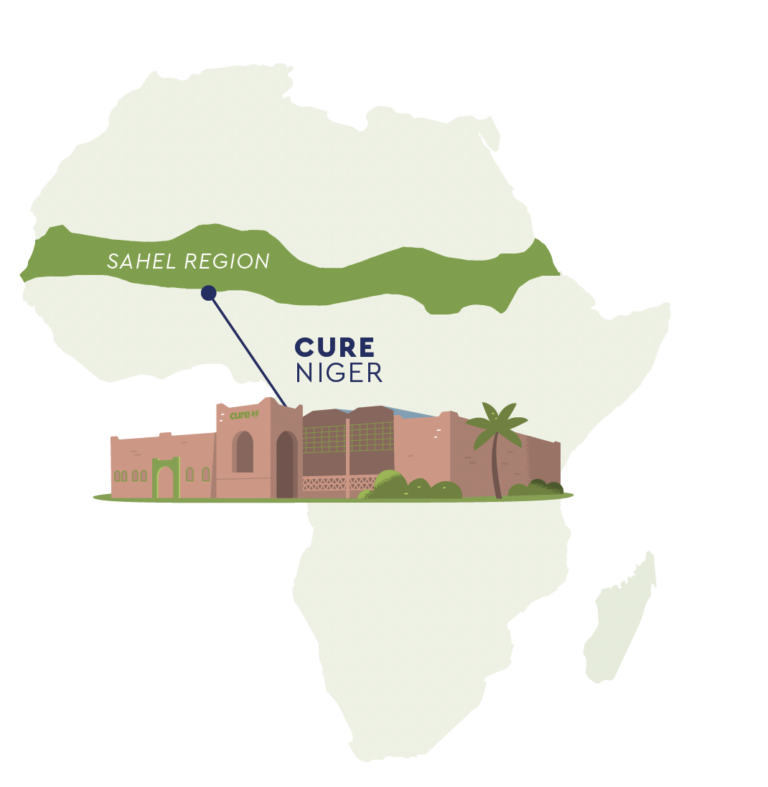
CURE estimates there are 665,000 children living with treatable disabilities in Niger, and the obstacles they face are almost insurmountable. Often, children arrive at CURE severely malnourished. That’s why CURE provides patients and their caregivers three meals per day to help them safely undergo surgery. They also send families home with a 50 lb. bag of rice.

Because children often need to stay at the hospital for weeks or even months, the hospital began a vocational training program to teach marketable skills like sewing, jewellry making, and knitting to mums and caregivers.
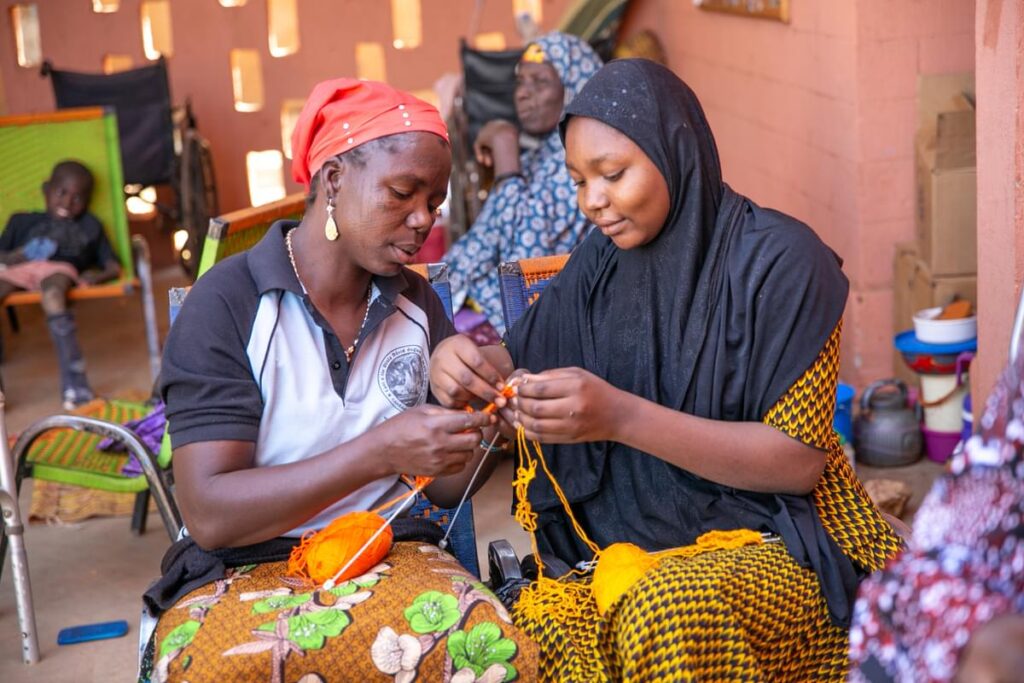
Torn by Trauma
There are over 224,000 internally displaced people in Niger, and almost half of that number comes from families fleeing terrorist attacks. Life as a refugee is hard enough—add to that a physical disability, and it becomes nearly impossible. That’s why CURE’s mobile clinics go to these conflict-filled regions to deliver care to vulnerable children. We partner with and train local pastors, equipping them to better serve their communities and to help CURE identify kids in need of surgical intervention.
Paul is one of these pastors who helped us identify Gregoire, a young boy living about 55 miles from Niamey, near the border with Burkina Faso. Gregoire developed a condition that caused his leg to swell and grow unevenly, preventing him from walking or working the family farm. His village regularly comes under attack by terrorists.
“We run into the bushes and wait for them to leave. Sometimes they even take people. People live every day in fear,” Kifalba, Gregoire’s mom, says. “Here at CURE, I found security. I was provided with shelter, food, medical help, and I thank God for it every time.”
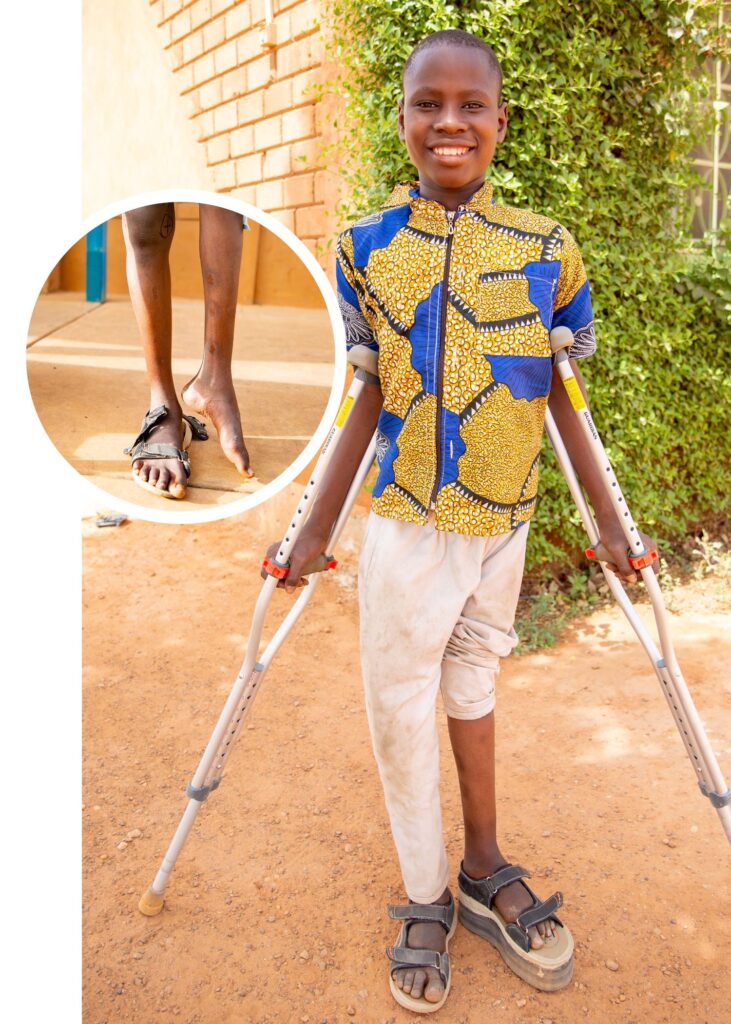
Gregoire (pictured above) is all smiles now after several successful surgeries to straighten his legs. While doctors work to get his legs the same length, an orthotic shoe helps him walk.
Gregoire thanks God for the care he received from CURE. He says, “Now I can walk around. I don’t feel ashamed, and I do not depend on anyone for that. People are amazed to see me walking, saying God is great.”
Ministry among Muslims
At CURE Niger, patients like Gregoire receive more than just life-changing medical care. They receive compassionate ministry care that helps them process the trauma that comes from living under pressure and in poverty.
Emanuel Mayaki, the Spiritual Director at CURE Niger, leads the team that cares for these emotional burdens from a biblical perspective. He says, “Patients come to our hospital with huge needs. Most of the patients come from terrorist-run areas. It’s a nightmare for them. They are not at peace; they are always thinking that an attack is coming. It’s challenging to encourage them. Simply saying ‘God loves you’ is not enough.”
Emanuel and his team spend time listening to their stories. For children who often aren’t encouraged to speak up in Nigerien culture, this is powerful. Through art therapy, organized play, free time in the playroom and on the state-of-the-art playground, they can experience the joy that comes from just being children.
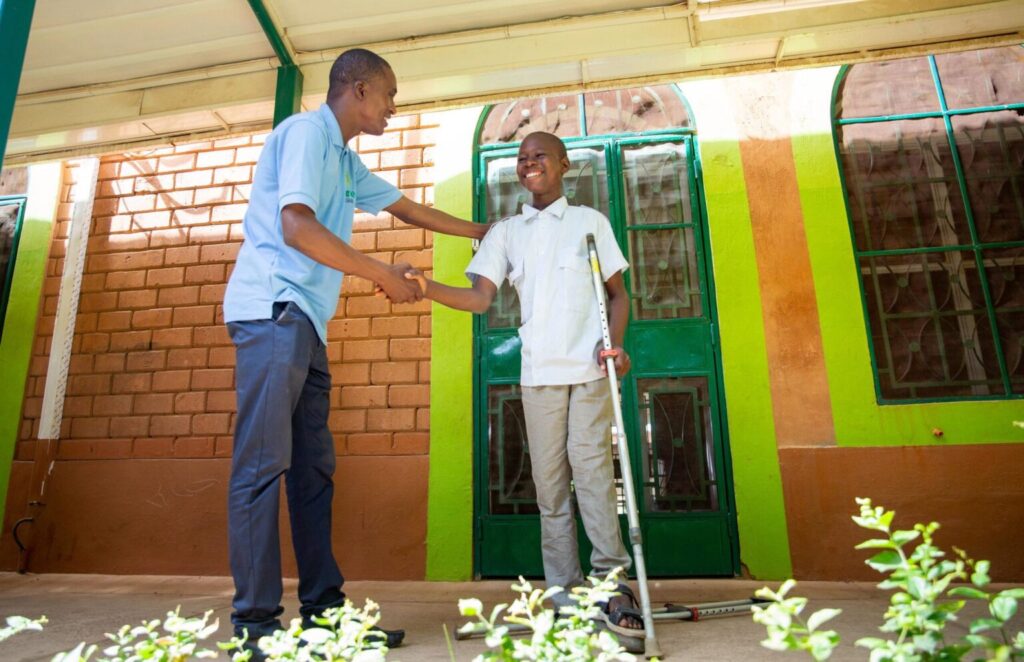
In Niger, where nearly 98 percent of the population is Muslim, this is the first time that many hear about Jesus or experience care from Christians. Because there is a culture of hostility toward Christians, Emanuel says that the CURE team is sensitive and intentional about sharing the gospel message.
“We have a challenge sharing the gospel in groups because people are afraid of being criticized for being open to the message. But, we can share with them one by one,” he says.
Since its inception, CURE Niger has reached more than 20,000 Muslims with the gospel, and nearly 9,000 have professed faith in Christ. Safaatou, a young girl from a devout Muslim family who came to CURE with her sisters for treatment for a bone condition, is among them.
Safaatou says, “When we came here, we went to the prayer meetings and learned about Jesus, and we decided to accept Him. We learned about His life and that He loves us.”
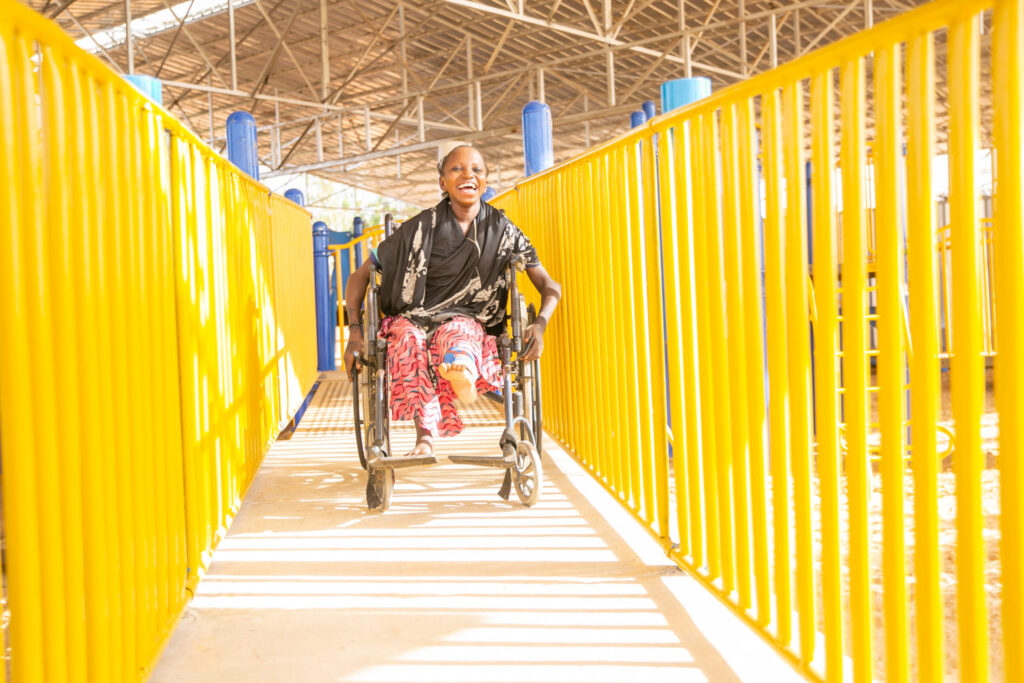
Today, the sisters are recovering at home and walking with Jesus. Safaatou says that people who thought demons were responsible for their condition are now amazed to see them walking. “I always tell them one thing: Jesus is stronger than the demons!”
On behalf of children like Gregoire and Safaatou, we thank you for your partnership with CURE in Niger. Through you, they and their families receive transformational medical care and learn that there can be hope, even in hard places.
Ways to Partner with CURE in Niger
Here are a couple of ways you can partner with CURE to help Niger’s children made vulnerable by disability.
- Make a gift specifically to CURE Children’s Hospital of Niger and provide surgical care to children suffering with clubfoot, cleft conditions, knock knees, bowed legs, and untreated burns.
- Spread the word! Share this article on your facebook, twitter, or via email to spread the word about CURE Children’s Hospitals.
[This article was originally published to the CURE International US website on 4th May 2023]
Related Articles
- CURE Doctors Fly to Neighbouring Country to Help Save Lives
- CURE Opens Largest Specialized Paediatric ICU Building in Uganda
- MedSend Sends Additional Surgeons to CURE Hospitals
- Children Burned in Horrific Schoolhouse Fire Receive Care from CURE Children’s Hospital of Niger
- Mercy Ships and CURE International Announce Partnership Providing Surgery to Reach More Children Living with Disabilities
- Vice President, Ugandan Government Officials Celebrate Major Milestone at CURE Uganda
Categories
About the Author: Melissa Hall
Melissa joined CURE UK in June 2021, heading up Marketing, Communications, and Events. On her visit to CURE Children's Hospital of Zimbabwe in September 2022 she experienced the people and the environment that makes a CURE hospital so special! She makes every effort to communicate this to readers everywhere.
